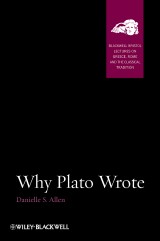Details

Why Plato Wrote
Blackwell-Bristol Lectures on Greece, Rome and the Classical Tradition, Band 2 2. Aufl.
|
28,99 € |
|
| Verlag: | Wiley-Blackwell |
| Format: | EPUB |
| Veröffentl.: | 11.07.2011 |
| ISBN/EAN: | 9781444351910 |
| Sprache: | englisch |
| Anzahl Seiten: | 244 |
DRM-geschütztes eBook, Sie benötigen z.B. Adobe Digital Editions und eine Adobe ID zum Lesen.
Beschreibungen
<i>Why Plato Wrote</i> argues that Plato was not only the world’s first systematic political philosopher, but also the western world’s first think-tank activist and message man. <ul> <li>Shows that Plato wrote to change Athenian society and thereby transform Athenian politics</li> <li>Offers accessible discussions of Plato’s philosophy of language and political theory</li> <li>Selected by Choice as an Outstanding Academic Title for 2011</li> </ul>
<p>Acknowledgments ix</p> <p>Abbreviations xi</p> <p>Prologue: Why Think about Plato? 1</p> <p><b>Part I: Why Plato Wrote 9</b></p> <p>Chapter 1: Who Was Plato? 11</p> <p>Chapter 2: The Importance of Symbols in Human Life 24</p> <p>Chapter 3: The Philosopher as Model-Maker 38</p> <p>Chapter 4: The Philosopher as Shadow-Maker 55</p> <p>Chapter 5: What Plato Wrote 70</p> <p>Chapter 6: How Plato Lived 79</p> <p><b>Part II: What Plato Did 87</b></p> <p>Chapter 7: The Case for Influence 89</p> <p>Chapter 8: Culture War Emergent 108</p> <p>Chapter 9: Culture War Concluded 122</p> <p>Epilogue: And to My Colleagues 143</p> <p>Appendix 1: The Relationship between Paradigms and Forms 148</p> <p>Appendix 2: A Second Tri-partite Division of the Soul? 154</p> <p>Appendix 3: Miso- Compounds in Greek Literature 158</p> <p>Notes 161</p> <p>References 206</p> <p>Further Reading 215</p> <p>Index 219</p>
<p> </p> “Packed with controversial theses, engagingly and intelligently written, iconoclastic – there’s not much wrong with this book as a work of ancient philosophy.” (<i>The Heythrop Journal</i>, 4 September 2013) <p>"In her bold and richly absorbing study, Why Plato Wrote, Danielle S. Allen argues that the answer to why Plato wrote is also the answer to the relation between the Platonic dialogues and Athenian political life ... He may have elected not to enter the political fray in Athens as ordinarily understood, but Danielle Allen shows with elegance and scholarship that he was indeed a politicos, just as Diogenes Laertius claimed." (<i>Times Literary Supplement</i>, 23 December 2011)</p> <p>"I have learned much from this book. It demands that we connect Plato's writing to real life in his city. Even those who do not share all its conclusions will be challenged by Allen's many original insights into how Plato used symbols to work on our intellect, our preconceptual beliefs, and our emotions." (<i>Bryn Mawr Classical Review</i>, 21 November 2011)</p> <p>"This extraordinary and scholarly book takes a fascinating new look at Plato as politikos. It is a joy to read. Excellent notes, bibliography, and index. Summing Up: Essential. Upper-level undergraduates through faculty/researchers." (<i>Choice</i>, 1 June 2011)</p>
<p><b>Danielle S. Allen</b> is UPS Foundation Professor at the Institute for Advanced Study at Princeton. She is the author of <i>The World of Prometheus: The Politics of Punishing in Democratic Athens</i> (2000) and <i>Talking to Strangers: Anxieties of Citizenship Since Brown vs. the Board of Education</i> (2004).</p>
<p><i>Why Plato Wrote</i> is the first book to be published in the prestigious Blackwell Bristol Lecture Series in Greece, Rome and the Classical Tradition. In this thought-provoking text Danielle Allen eloquently argues that Plato wrote to change Athenian culture and thereby transform Athenian politics. She makes the case that Plato was not only the world’s first systematic political philosopher, but also the western world’s first think-tank activist and message man.</p> <p>Allen contends that the roles of philosopher and message man were not mutually exclusive, and that Plato’s pursuit of language as a vehicle for affecting cultural norms was grounded in his philosophy of language. <i>Why Plato Wrote</i> is a lucid and engaging commentary on Plato’s philosophy of language and its relation to his political theory.</p>
<p>“In this groundbreaking book Danielle Allen gives us Plato for the 21st century: a boldly pragmatic and fiercely political philosopher, a ‘legislator of the world’ whose vivid writing reframed the moral practices of real communities, a provocative and successful linguistic entrepreneur whose Socratic dialogues sparked a culture war that defined Athenian politics in the Age of Alexander. Compelling reading for anyone who cares passionately about philosophy, politics, or classical Greece.”<br /> <i>Josiah Ober, Stanford University</i></p> <p>“Why Plato Wrote is a deep and original work of scholarship, a model of how the history of political philosophy should be studied, and a pleasure to read.”<br /> <i>Richard Kraut, Northwestern University</i></p> <p>“Allen finds Plato to have invented himself as a writer in order to use language as a route to social change. The simple question 'why Plato wrote' unlocks a key to Plato's political thought which no future scholar will be able to do without.”<br /> <i>Melissa Lane, Princeton University</i></p>


















